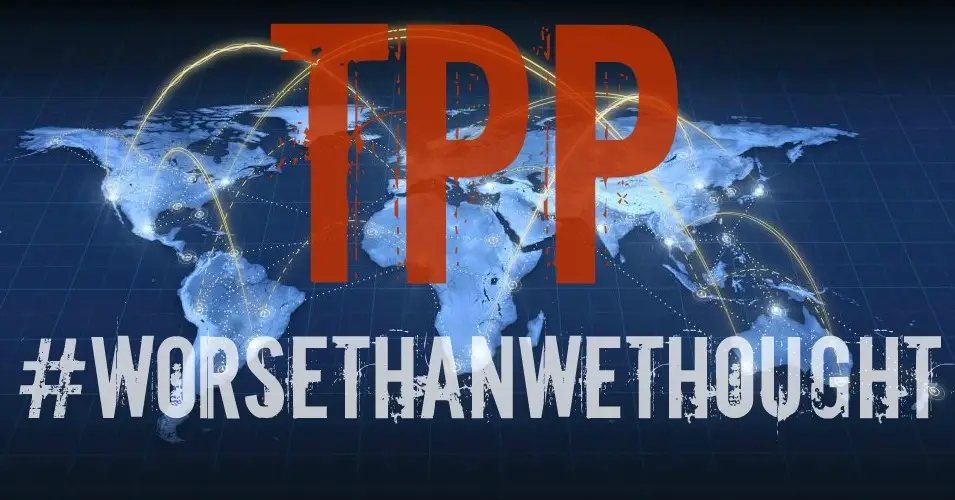11th November 2015
Via Public Citizen
Secret TPP Text Unveiled: It’s worse than we thought, with limits on food safety and controversial investor-state system expanded, rollback of Bush-era medicine access and environmental terms. Long-awaited text reveals gaps between administration claims and actual TPP terms on key congressional and public concerns.
Thursday’s long-awaited release of the text of the Trans-Pacific Partnership (TPP) reveals that the pact replicates many of the most controversial terms of past pacts that promote job offshoring and push down U.S wages while further expanding the scope of the controversial investor-state system and rolling back improvements on access to affordable medicines and environmental standards that congressional Democrats forced on the George W. Bush administration in 2007.
“Apparently, the TPP’s proponents resorted to such extreme secrecy during negotiations because the text shows that the TPP would offshore more American jobs, lower our wages, flood us with unsafe imported food and expose our laws to attack in foreign tribunals,” said Lori Wallach, director of Public Citizen’s Global Trade Watch. “When the administration says it used the TPP to renegotiate NAFTA, few expected that meant doubling down on the worst job-killing, wage-suppressing NAFTA terms, expanding limits on food safety and rolling back past reforms on environmental standards and access to affordable drugs.”
On some key issues, the text reveals provisions that will cost TPP support from members of Congress who supported the narrow passage of Fast Track trade authority this summer, and affirm for the many members of Congress who backed past trade deals but opposed Fast Track that the TPP must be stopped.
“Many in Congress said they would support the TPP only if, at a minimum, it included past reforms made to trade pact intellectual property rules affecting access to affordable medicines. But the TPP rolls back that past progress by requiring new marketing exclusivities and patent term extensions, and provides pharmaceutical firms with new monopoly rights for biotech drugs, including many new and forthcoming cancer treatments,” said Peter Maybarduk, director of Public Citizen’s Access to Medicines program. “The terms in this final TPP text will contribute to preventable suffering and death abroad, and may constrain the reforms that Congress can consider to reduce Americans’ medicine prices at home.”
The text also confirms that demands made by Congress and key constituencies were not fulfilled.
“From leaks, we knew quite a bit about the agreement, but in chapter after chapter, the final text is worse than we expected with the demands of the 500 official U.S. trade advisers representing corporate interests satisfied to the detriment of the public interest,” said Wallach.
Thursday’s text release confirms concerns about the TPP that were based on earlier leaks and reveals ways in which the TPP rolls back past public interest reforms to the U.S. trade model and expands anti-public interest provisions demanded by the hundreds of official U.S. corporate trade advisers:
Anti-public-interest provisions that are worse than past U.S. trade pacts:
- The TPP Intellectual Property Chapter would roll back the “May 2007” reforms for access to medicines.
- The TPP Environment Chapter would roll back the “May 2007” reforms by eliminating most of the seven Multilateral Environmental Agreements that past pacts have enforced.
- The TPP Investment Chapter would expand the scope of policies that can be challenged and the basis for such challenges, including for the first time ever allowing investor-state dispute settlement (ISDS) enforcement of World Trade Organization intellectual property terms and new challenges to financial regulations.
- With Japanese, Australian and other firms newly empowered to launch ISDS attacks against the United States, the TPP would double U.S. ISDS exposure with more than 9,200 additional subsidiaries operating here of corporations from TPP nations newly empowered to launch ISDS cases against the U.S. government. (About 9,500 U.S. subsidiaries have ISDS rights under ALL existing U.S. investor-state-enforced pacts.)
- The TPP E-Commerce Chapter would undermine consumer privacy protections for sensitive personal health, financial and other data when it crosses borders by exposing such policies to challenge as a violation of the TPP limits on regulation of data flows.
- TPP “Sanitary and Phytosanitary” chapter terms would impose new limits on imported food safety relative to past pacts. This includes new challenges to U.S. border inspection systems that can be launched based on extremely subjective requirements that inspections must “limited to what is reasonable and necessary” as determine by a TPP tribunal. New language that replicates the industry demand for a so-called Rapid Response Mechanism that requires border inspectors to notify exporters for every food safety check that finds a problem and give the exporter the right to bring a challenge to that port inspection determinations – meaning new rights to bring a trade challenge to individual border inspection decisions (including, potentially, laboratory or other testing) that second-guesses U.S. inspectors and creates a chilling effect that would deter rigorous oversight of imported foods.
Anti-public interest provisions that are the same as past U.S. pacts:
- The TPP Investment Chapter would eliminate many of the risks and costs of relocating American jobs to low-wage countries, incentivizing more American job offshoring.
- The TPP procurement chapter would offshore our tax dollars to create jobs overseas instead of at home by giving firms operating in any TPP nation equal access to many U.S. government procurement contracts, rather than us continuing to give preference to local firms to build and maintain our public libraries, parks, post offices and universities.
- Contrary to Fast Track negotiating objectives, the TPP would grant foreign firms greater rights than domestic firms enjoy under U.S. law and in U.S. courts. One class of interests – foreign firms – could privately enforce this public treaty by skirting domestic laws and courts to challenge U.S. federal, state and local decisions and policies on grounds not available in U.S. law and do so before extrajudicial ISDS tribunals authorized to order payment of unlimited sums of taxpayer dollars.
- There are no new safeguards that limit ISDS tribunals’ discretion to issue ever-expanding interpretations of governments’ obligations to investors and order compensation on that basis. The text reveals the same “safeguard” Annexes and terms that were included in U.S. pacts since the 2005 Central America Free Trade Agreement (CAFTA) that have failed to rein in ISDS tribunals. CAFTA tribunals have simply ignored the “safeguard” provisions that are replicated in the TPP, and as with past pacts, in the TPP such tribunal, conduct is not subject to appeal.
- The TPP would ban the use of capital controls and other macroprudential financial regulations used to prevent speculative bubbles and financial crises.
Please see a bullet point analysis of key TPP investment, food safety, labor and environmental, market access, rules of origin, procurement and other provisions prepared by labor and public interest experts for more details. More detailed analyses of each chapter will be available next week.
The TPP can take effect only if the U.S. Congress approves it, given the rules specifiying the conditions that must be met for the TPP to go into effect. The TPP’s fate in Congress is uncertain at best given that, since the trade authority vote, the small bloc of members of the U.S. House of Representatives who made the narrow margin of passage possible have expressed concerns that the text release shows were not addressed.
Ten U.S. presidential candidates have pushed anti-TPP messages in their campaigning, stoking U.S. voters’ ire about the pact.
An unprecedented number and wide array of organizations oppose any attempt to railroad the TPP through Congress by using the Fast Track process. Groups united on this extend well beyond labor unions and include consumer, Internet freedom, senior, health, food safety, environmental, human rights, faith, LGBTQ, student and civil rights organizations.
“Now that Congress and the public can scrutinize the actual text, the reality that it fails to meet Congress’ demands and its terms would be harmful to most Americans will replace the administration’s myth-based sales job for the TPP, further dimming the TPP’s prospects in Congress,” Wallach said.
TPP Text Reveals Risk for Consumer Privacy Reform, Would Limit Options for Online Privacy Policies
The future of consumer privacy protection may also be imperiled by the Trans-Pacific Partnership (TPP), Public Citizen said Thursday. The final text of the TPP E-Commerce chapter reveals rules that could tie the hands of policymakers seeking to safeguard consumer and Internet user privacy, according to Public Citizen’s analysis of the text.
“The E-Commerce chapter has serious implications for online privacy,” said Peter Maybarduk, director of Public Citizen’s information society program. “The text reveals that policies protecting personal data when it crosses borders could be subject to challenge as a violation of the TPP.”
The E-Commerce chapter includes rules that would require countries to allow the unregulated cross-border transfer of Internet users’ data and prohibit governments from requiring companies to host data on local servers, subject to certain exceptions. While privacy should be considered such an exception, privacy and data protection policies are not expressly protected under the TPP rules.
Instead, such policies would be subject to review by TPP tribunals empowered to decide if the policies meet several highly subjective, restrictive standards. These TPP standards replicate language in World Trade Organization agreements under which tribunals have ruled against domestic policies in 43 of 44 challenges. Yet, only those privacy and data protection policies determined to meet these tests would be considered permissible.
Information technology companies and industry associations have lobbied to ban or seriously limit government regulation of cross-border data flows as a means to keep down industry costs. At a U.S. House Judiciary Committee hearing this week, representatives from those groups testified that any exceptions should be narrow.
“The IT companies are getting what they want, but what about consumers and Internet users?” said Burcu Kilic, a policy director with Public Citizen’s information society program.
Policy options for governments that want to protect privacy include conditioning international data transfers on compliance with data protection regulations. Such policies may be exposed to challenges by other governments under the TPP as well as through extra-judicial tribunals empowered by the agreement’s controversial Investor State Dispute Settlement mechanism.
“In some cases, our data may be vulnerable in another country – to surveillance or marketing abuses – in ways that it is not at home,” said Maybarduk. “The TPP could limit governments’ ability to protect us against such threats.”
Through these provisions in the TPP, the United States appears to be moving to limit policy options for safeguarding privacy across borders, even while the European Union moves to expand them. The European Court of Justice recently struck down its “Safe Harbor” arrangement with the United States, saying the regime, which was based on companies self-certifying compliance with European privacy protections when moving personal data to the U.S., did not adequately protect European consumers. The European Union will seek more robust data protection in new negotiations with the United States.
The TPP could limit the ability of the United States and other countries to follow Europe’s path, or to protect privacy by conditioning the movement of data across borders on compliance with the host country’s privacy rules for personal information.
“The memory of misuse of data and National Security Agency surveillance is so fresh, and we should be careful about giving up control of our data,” said Kilic.
Country rules requiring the “localization” of either data or computing facilities (such as servers) have been used by some governments to support efforts at censorship. But local data protections also include privacy rules – for example, rules preventing cross-border trade in patients’ health information collected by private entities, which could easily be caught in the TPP’s broad sweep.
“Data flows often are beneficial,” Maybarduk said. “At the same time, rules mandating data flows should be narrowly tailored with exceptions that clearly and explicitly allow for the protection of privacy and individual liberties.”
The text also includes provisions on net neutrality and software source code.
“It is important not to give up on protection of privacy,” Kilic said. “The substantive obligations of the TPP E-Commerce chapter would impose more constraints on domestic policy space. The measures protecting individuals’ rights and liberties need to be broader and easier to use than ever before.”
Modeled after the North American Free Trade Agreement, the TPP is a pact among the U.S., Australia, Brunei, Canada, Chile, Japan, Malaysia, Mexico, New Zealand, Peru, Singapore and Vietnam. The negotiating governments released the TPP text Thursday, which still must be considered by Congress.
With the final congressional approval process looming, now is the time to act. STOP the TPP!

If you've ever found value in our articles, we'd greatly appreciate your support by purchasing Mindful Meditation Techniques for Kids - A Practical Guide for Adults to Empower Kids with the Gift of Inner Peace and Resilience for Life.
In the spirit of mindfulness, we encourage you to choose the paperback version. Delve into its pages away from screen glare and notifications, allowing yourself to fully immerse in the transformative practices within. The physical book enriches the learning process and serves as a tangible commitment to mindfulness, easily shared among family and friends.
Over the past few years, Wake Up World has faced significant online censorship, impacting our financial ability to stay online. Instead of soliciting donations, we're exploring win-win solutions with our readers to remain financially viable. Moving into book publishing, we hope to secure ongoing funds to continue our mission. With over 8,500 articles published in the past 13 years, we are committed to keeping our content free and accessible to everyone, without resorting to a paywall.










